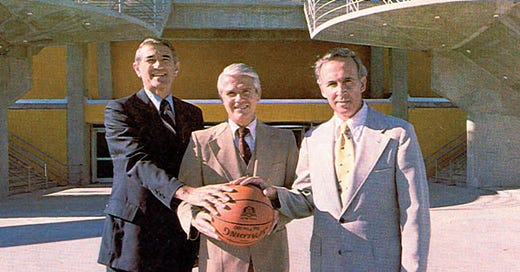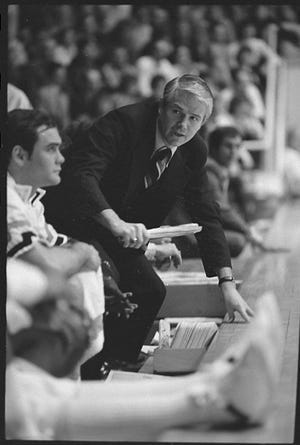The last time Purdue made the Final Four, it lost its coach to South Florida. Seriously
Lee Rose was a rising star who had just guided the Boilermakers to the 1980 Final Four, but in a flash, he was gone to a fledgling program. What happened?
Last Sunday, a weight was lifted off the shoulders of Purdue’s men’s basketball program in a public and palpable way.
As the final seconds ticked off the clock of the Boilermakers’ 72-66 victory against Tennessee in the Elite Eight, the crowd erupted, making a game played nearly 300 miles away from the school’s West Lafayette, Ind., campus feel as though it was inside Mackey Arena. Zach Edey, the team’s 7-foot-4 star center, rushed to the sideline to wrap his arms around coach Matt Painter in a tight embrace. The normally zareserved Edey said in a postgame interview with CBS that Purdue’s players are “fucking winners.”
Just over one full year after they became just the second No. 1 seed to ever lose to a No. 16 seed, the Boilermakers had every reason to celebrate. They were still two wins from a championship, but they made it to a destination they hadn’t in quite some time.
The victory against the Volunteers sent Purdue to its first Final Four since 1980, a dubious, 44-year-old distinction that hovered over the program and, in many ways, came to define it. The Boilermakers could rack up wins in the regular season as much as any of the sport’s biggest powers, but once it came time for the bright lights and immense pressure of the NCAA Tournament, they wilted, continually falling just short of the accomplishments that define players, coaches, teams, programs and entire universities, with the 2023 loss to Fairleigh Dickinson serving as the most recent and loudest reminder.
Even the joy from its most recent Final Four was fleeting. Thirteen days after its semifinal loss to UCLA that year, Purdue lost the coach who led it there, Lee Rose, to South Florida.
Yes, you read that correctly.
In a move that would be unthinkable now beyond a coach trying to get ahead of his inevitable firing – and was only slightly more unimaginable back then – Rose left the Boilermakers after just two seasons and a 50-18 record, abandoning a blossoming Big Ten powerhouse to take over a nascent program in a nascent league.
Since Rose’s departure, Purdue has become a model of stability, with only two head coaches since 1980, the fewest of any Power Five or Big East program aside from Syracuse and Michigan State.
While the school won’t have to worry about Painter making a similarly stunning decision in the days after Purdue leaves Glendale, Ariz., this year, its return to the Final Four offers an interesting opportunity to look back at a much different time for the program and the sport.
How Lee Rose got Purdue to the promised land
Rose was a man forever defined by his roots, someone who was described in seemingly any newspaper story in which he was quoted as a Kentucky native with well-coiffed hair, a comforting drawl and a prim-and-proper demeanor.
Indeed, Rose’s road to coaching began in his home state. He attended and played at Transylvania University, a small private school in Lexington, Ky., that’s in the literal and metaphorical shadow of the University of Kentucky. He remained there for several years after his graduation working as an assistant coach under future Basketball Hall of Famer C.M. Newton before eventually taking over for Newton when his mentor left to become the head coach at Alabama.
He was an instant success with the Pioneers, a Division III program that’s inexplicably not named the Vampires. His teams won at least 20 games in seven of his eight seasons at his alma mater, a resume that, like Newton, ultimately earned him a promotion to the Division I ranks.
In 1975, Rose took over at Charlotte, then known as UNC Charlotte, where he inherited a strong program from Bill C. Foster, who left the 49ers to become the head coach at Clemson. Rose instantly built upon that sturdy foundation and exceeded what was previously thought to be possible with the program. In just Rose’s second season, and led by future NBA Finals MVP Cedric “Cornbread” Maxwell, Charlotte went 28-5 and advanced all the way to the 1977 Final Four, where it lost by only two to eventual national champion Marquette. For his efforts, Rose was named the Sporting News national coach of the year.
One year later, and on the heels of another impressive season, he was hired away by Purdue. Nine years removed from making the national championship game, the Boilermakers were looking for a jolt. The program had been solid under coach Fred Schaus, but with Bob Knight assembling a superpower 100 miles to the south at archrival Indiana, Purdue needed its own Xs and Os wizard, particularly one who could maximize the talent and effectiveness of rising junior center Joe Barry Carroll. If Rose managed to accomplish what he did at Charlotte, what could he do with the resources of a Big Ten school located in a basketball-obsessed state teeming with talent?
It didn’t take him long to answer that question.
In his first season, the Boilermakers went 27-8 and shared the Big Ten regular season championship with a Magic Johnson-led Michigan State team that went on to win the national title. Though they lost out on the league’s automatic NCAA Tournament berth to the Spartans due to a head-to-head tiebreaker, they made a run to the NIT championship, where they fell to Knight and the Hoosiers, 53-52.
Bitter as that ending was, the next season had even more in store. A Purdue team that had risen as high as No. 8 in the national polls in early January went 3-4 in its final seven regular-season games, but made a run in the NCAA Tournament as a No. 6 seed, defeating La Salle 90-82 in the first round, upsetting No. 3 seed St. John’s 87-72 in the second round, getting a measure of revenge against Indiana with a 76-69 win in the Sweet 16 and knocking off No. 4 seed Duke 68-60 in the Elite Eight.
Though their whirlwind journey ended with a narrow 67-62 loss to UCLA in the Final Four in nearby Indianapolis, the Boilermakers were well-positioned for whatever awaited them, with a soon-to-be top NBA Draft pick to market to recruits, some hard-earned bragging rights over the state’s preeminent power and, perhaps most of all, a 43-year-old coach who wasted little time getting them back to the sport’s biggest stage.
What could go wrong?
Every Rose has its thorn…and an urge to move to Florida
For all the wins and the glory they enjoyed together, the marriage of Purdue and Rose showed cracks well before the Final Four appearance.
Keep reading with a 7-day free trial
Subscribe to The Front Porch to keep reading this post and get 7 days of free access to the full post archives.





